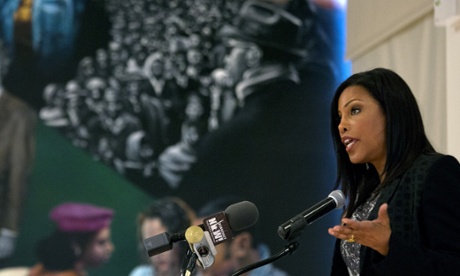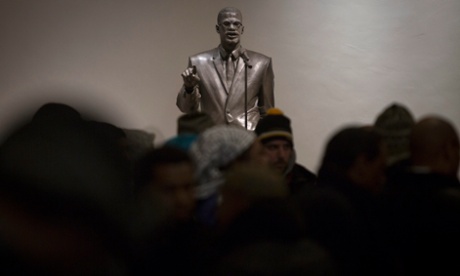
On the 50th anniversary of the assassination of Malcolm X, family members and New York leaders commemorated the charismatic and controversial civil rights leader. They did so, however, largely without linking his life and work to recent protests over issues of race and policing.
On Saturday afternoon, at the Malcolm X and Dr Betty Shabazz Memorial and Education Center in Washington Heights, some 300 people crowded into a building near the place where Malcolm X was shot dead in 1965. On the wall of a wide hall, a massive and colorful mural depicted his life through his journeys around the US, on pilgrimage in the Middle East and while speaking in Europe.
One of his daughters, Ilyasah Shabazz, led the room in a moment of silence near the hour at which Malcolm X was shot, and urged her audience – which included elected officials, professors, religious leaders and community organizers – to take responsibility for future generations.
Linking her father’s death to the suffering of those who died as slaves or fighting for civil rights, Shabazz said: “It’s important that we ensure that their lives were not taken in vain.” At an earlier rally, she said her father must not be “written out of history”.
New York state senator James Sanders, from the borough of Queens, called for state and federal authorities to reopen the investigation into Malcolm X’s murder, which has been a sore point for generations. Sanders said he would ask Mayor Bill de Blasio to sign a letter in support of a new investigation, though he added that no matter what, X’s legacy had overcome his killer.
“They thought they could get rid of him,” Sanders said, “but he’s alive today.”
Referring to protests last year over the deaths of two black men, Michael Brown and Eric Garner, at the hands of white police officers, Sanders said of Malcolm X: “I saw him leading a march in Ferguson, I saw him in Staten Island.”
But aside from Sanders, few spoke of today’s justice movements, a point which frustrated Rodnell Collins, a nephew of Malcolm X and curator of his uncle’s home in Boston.
“This is symbolism today but where’s the substance?” he asked the Guardian. He then gestured out over the crowd – well-dressed and full of prominent New York leaders – and wondered out loud why more of the young people who have recently marched on the streets had not been invited to learn about his uncle’s message.
Collins said “nobody hears the message that’s relevant today” from Malcolm X’s work, and that supporters should be using his ideas to “deprogram” institutional racism rather than as part of rote history lessons of about his life.
“Every African American thinks that they’re the only story, but Malcolm X knew to connect African Americans with South Africans, with colonialism, with capitalism, with every ism you can think of,” he said.
Stephen Tuck, an Oxford professor of world history and author of The Night Malcolm X Spoke at the Oxford Union, said Malcolm X had a “profound impact around the world, partly because he traveled extensively, but also because he spoke of an interconnected global struggle for human rights.”
“He saw global human rights not as problem of Alabama sheriffs but as systems of inequality that white liberal people were complicit in.”
“He also was this remarkable communicator,” Tuck added. “Not that many people at any time could command an audience in Harlem and then three days later go to Oxford, put on a tuxedo, and hold international students mesmerized.”

The afternoon memorial, full of carefully orchestrated remarks, musical tributes to a “martyred” leader, and loving remembrance of “our shining black prince”, contrasted sharply with the morning rally in Harlem, some 20 blocks south.
In a well-used, makeshift audience hall, the National Action Network (NAN) civil rights group went through its weekly administrative chores – a campaign to stop a proposed police law, a call to support Aids victims, an invitation to “Thursday legal night” – in casual camaraderie.
Shabazz spoke before the crowd of Harlem locals as well, exhorting them to action in more urgent tones than she those she used before the various dignitaries later in the day. She said the community bore the responsibilities her father took up.
“He wanted to uplift his people, re-liberate his people, he understood that they had purpose and life and had to ensure that we empowered the next generation,” she said. “When we understand history we understand that we can’t sit back and wait for someone to do something for us. It’s our responsibility. We have to do it.”
Shabazz urged her audience to make sure that “educational curriculums are inclusive of our history, and that it’s inclusive all the time, not just during the month of February [Black History Month], but that it’s part of our American educational curriculum”.
NAN officials spoke about a need to campaign against proposed changes to curriculums, in Texas for instance, which they said would sanitize or even whitewash black history.
Not yet three years old when her father Malcolm X was shot dead in Harlem in 1965, Shabazz said she was inspired into activist work by her mother, Betty Shabazz, who was “committed to making sure her husband was not written out of history”.
Shabazz left word of Ferguson, Staten Island and other recent flashpoints to another speaker, Reverend Al Sharpton.
The TV host and NAN founder spoke trim and tailored before the crowd of men and women wearing rumpled sweaters, winter hats and sweatshirts. The audience was also notably absent of younger activists, such as those who have frequented Black Lives Matter protests prompted by the killings of Garner and another unarmed black man, Akai Gurley, by NYPD officers last year.
Sharpton remarked on a wide range of topics, including the group’s protest of overwhelmingly white Academy Award voters and his recent tête-a-tête with Kanye West and Kim Kardashian on Saturday Night Live. Sharpton used former New York mayor Rudy Giuliani, who recently said President Barack Obama does not love America, as a punchline: “Rudy first of all needs a hug.”
Giuliani’s comments were the “ramblings of a fading Republican who will say and do anything for attention”, Sharpton said.
Of civil rights movements past and present, Sharpton said Dr Martin Luther King Jr and Malcolm X were not conflicting forces, as is often supposed, but rather that “sitting here arguing about Martin and Malcolm is like arguing about your momma and daddy”.
“You’re the child of both of them,” he said, describing the leaders as “a strategic one-two punch” of the civil rights movement.
He concluded with a call to keep faith and celebrate the achievements of the civil rights movement, asking the crowd to hold faith even “when it doesn’t seem like there’s a way out”. The fruits of faith, Sharpton said, are “why 50 years to the day they shot Malcolm down in cold blood, they’re calling his name all over the world”.
Slipping into the full postures and mannerisms of a preacher, Sharpton shouted at the crowd to “hold on” in the hopes of justice for those such as Garner and Brown. His words ended the rally in a jubilant mood, long after Shabazz had quietly departed.
The afternoon memorial also ended on an emotional note. Dr Ron Daniels, a lecturer at the City University of New York and a longstanding activist, ended the event with a chant that made it clear he felt the civil rights movement far from over. He led the audience to its feet to shout: “Long live Malcolm X.”







